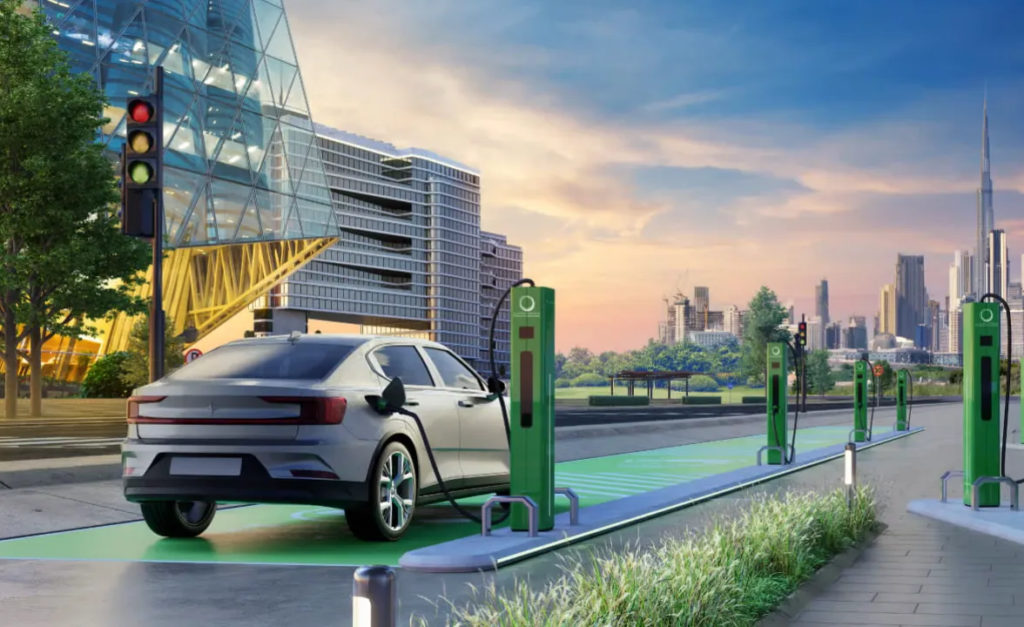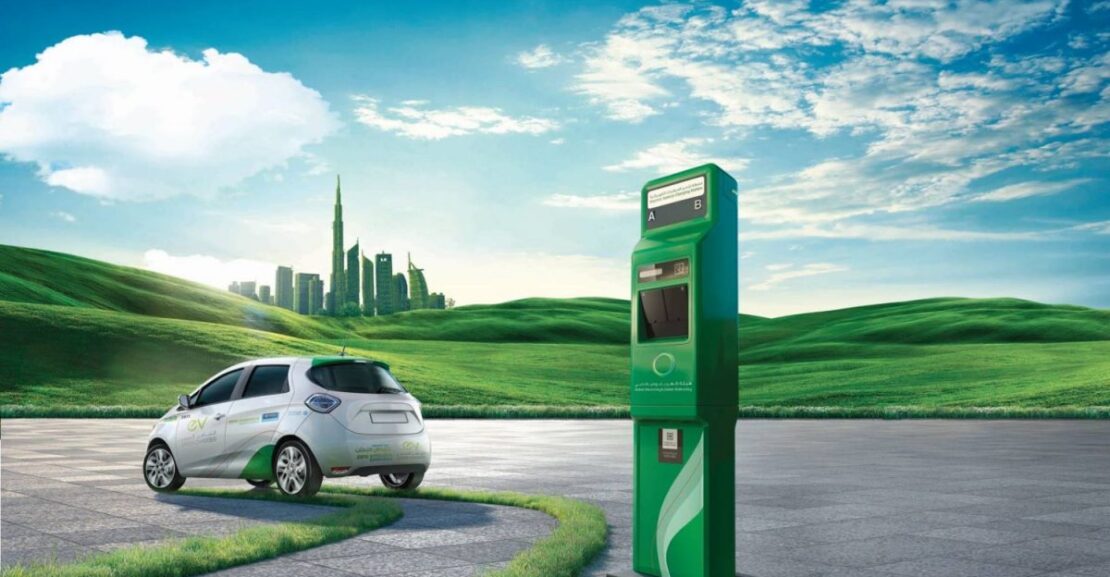Dubai Expands EV Network: 1,270 Charging Points for 40,600 Cars.Dubai has always been recognized as a city that pushes boundaries. From the tallest building in the world to some of the most ambitious infrastructure projects on the planet, it has consistently positioned itself as a hub of progress. Now, the city is charging forward into a new arena sustainable transportation. With more than 1,270 electric vehicle (EV) charging points spread across the city, Dubai is now serving over 40,600 electric and hybrid cars, making it a leader in the Middle East’s transition to cleaner mobility.
This development is not just about installing charging points it’s about reshaping how people live, commute, and think about energy use. The city’s leadership has clearly set its eyes on reducing carbon emissions and creating a cleaner environment while ensuring residents enjoy world-class infrastructure. For a city that thrives on innovation, adopting electric vehicles is not just a trend, but a carefully mapped vision for the future.
Why Electric Vehicles Matter in Dubai
Dubai is a city that has historically relied heavily on cars. Wide roads, long commutes, and a love for luxury vehicles have made it one of the most car-centric cities in the world. However, this also meant that pollution, fuel consumption, and traffic emissions were real challenges. The adoption of electric vehicles has given Dubai an opportunity to flip the narrative.
Electric vehicles contribute significantly to reducing greenhouse gas emissions, improve air quality, and cut down on reliance on fossil fuels. For a city where innovation and sustainability often go hand in hand, EVs represent more than just cars they represent a lifestyle that embraces responsibility without compromising on comfort or modernity.
Dubai’s vision aligns with global trends where countries and cities are competing to shift toward cleaner transportation. While many parts of the world are still in the early stages of EV adoption, Dubai has jumped ahead by combining policy support, infrastructure development, and public awareness campaigns to make EVs accessible and desirable.
Infrastructure That Makes the Transition Easy
The real success behind Dubai’s EV adoption lies in its infrastructure. Having 1,270 charging points spread strategically across the city ensures that EV owners never feel restricted by the fear of running out of charge. From shopping malls and residential neighborhoods to highways and office complexes, charging stations are becoming a normal part of everyday life.
This extensive network ensures convenience, which is often the deciding factor for people considering switching from traditional fuel-based cars to electric vehicles. In cities where charging stations are scarce, EV adoption can feel like a risk. Dubai has solved this by investing early and making sure its infrastructure keeps pace with growing demand.
Moreover, these charging points are designed to be user-friendly, fast, and reliable. Many stations offer fast-charging capabilities, meaning drivers can recharge their cars in a matter of minutes rather than hours. This reflects the city’s commitment to not just providing infrastructure, but also making it efficient and accessible for everyone.

The Numbers That Speak for Themselves
Numbers often tell the real story, and Dubai’s numbers are remarkable. Serving more than 40,600 electric and hybrid cars is a huge milestone, especially in a region where fuel prices have traditionally been low and gas-powered cars dominated the roads.
This achievement reflects not only the success of infrastructure but also the changing mindset of residents. People are actively choosing EVs as their primary mode of transportation, signaling a cultural shift that aligns with Dubai’s long-term sustainability goals.
The growth has been exponential. Just a few years ago, electric cars were seen as niche, often associated with high costs or limited availability. Today, they are increasingly becoming mainstream in Dubai, thanks to incentives, awareness campaigns, and an expanding network of charging points.
Government Support and Forward-Thinking Policies
One of the biggest reasons Dubai has been able to achieve this success is its leadership’s clear vision and commitment. Policies promoting EV use, such as free parking in certain areas, toll exemptions, and incentives for buyers, have created a strong push for adoption.
Dubai has tied its EV strategy closely to its broader vision for 2030 and beyond. The goal is to reduce reliance on traditional fuel, lower emissions, and position the city as a global leader in sustainability. By aligning transportation policies with climate goals, Dubai is ensuring that its growth remains future-ready.
This level of government support reassures residents that EVs are not just a passing trend but a long-term commitment. When people see consistent policies and infrastructure investments, they feel more confident making the switch.
Impact on Daily Life and Residents
For residents, the expansion of EV charging points has had a noticeable impact on daily life. Owning an EV is no longer seen as a challenge but as a smart choice. Many people now enjoy the benefits of lower running costs, smoother drives, and the satisfaction of contributing to a cleaner environment.
Families have started adopting EVs for their regular commutes, while businesses are also integrating electric fleets for logistics and services. Ride-hailing services are increasingly offering EV options, giving passengers a greener choice for their travel needs.
The psychological impact is also significant. Seeing EVs on the road and charging points in public spaces makes clean transportation feel like the new normal. This visibility helps break down the perception that EVs are futuristic or out of reach it shows they are here, accessible, and practical.
The Business and Economic Angle
The growth of EV adoption and infrastructure in Dubai is also creating opportunities for businesses. The automobile industry is seeing a rise in demand for electric vehicles, while energy companies are innovating to provide efficient charging solutions.
Startups and tech companies are also stepping in, offering apps that help locate charging stations, track energy use, and make payments seamless. This is creating a new ecosystem of businesses built around EVs, further boosting the local economy and positioning Dubai as a hub for innovation.
Moreover, the investment in EV infrastructure is helping diversify Dubai’s economy. Traditionally reliant on oil and gas, the city is now signaling that its future lies in renewable energy, smart technology, and green solutions. This not only benefits residents but also strengthens Dubai’s global reputation as a leader in sustainable innovation.

Environmental Benefits That Can’t Be Ignored
At the heart of this transition lies the environmental impact. With over 40,600 EVs on the road, Dubai is already seeing a reduction in carbon emissions. Cleaner air, reduced noise pollution, and a more sustainable use of energy are direct results of this change.
For a city that attracts millions of tourists every year, maintaining a clean and sustainable environment is crucial. EV adoption is a strong statement to the world that Dubai is serious about protecting its environment while offering world-class living standards.
The reduction in reliance on fossil fuels also strengthens energy security. By diversifying energy sources and promoting clean alternatives, Dubai is preparing itself for a more resilient future.
The Road Ahead: What’s Next for Dubai’s EV Journey
While the current achievements are impressive, Dubai’s EV journey is far from over. The city is expected to continue expanding its network of charging points, ensuring even greater coverage and faster charging technologies. With advancements in battery efficiency, future EVs will be able to travel longer distances on a single charge, making them even more attractive.
The government’s long-term plans include integrating renewable energy into the charging grid, ensuring that EVs are powered by clean energy from start to finish. Solar-powered charging stations and smart grid integration are already being discussed, which will further solidify Dubai’s position as a pioneer in sustainable transportation.
The coming years will also likely see more international partnerships, bringing advanced EV models to the city and encouraging research and development in clean mobility. Dubai is not just adopting EVs it’s creating an ecosystem where innovation, sustainability, and daily life come together seamlessly.
A Global Inspiration
What makes Dubai’s achievement so remarkable is the speed and scale of its success. In just a few years, it has gone from having limited EV infrastructure to building one of the most extensive charging networks in the region. This progress is a model for other cities around the world that are looking to adopt clean mobility but face challenges in infrastructure and public acceptance.
Dubai’s story shows that with the right mix of vision, investment, and community involvement, a city can transform its transportation landscape in record time. It’s a reminder that sustainability is not just an idea for the future it’s something that can be achieved now, with the right mindset and commitment.
Conclusion: Driving Toward a Cleaner Tomorrow
Dubai’s expansion of EV infrastructure, with over 1,270 charging points serving more than 40,600 cars, is more than just a technological achievement it’s a cultural shift, an environmental win, and an economic opportunity.
For residents, it means cleaner air, smarter mobility, and greater convenience. For businesses, it creates new opportunities in technology, energy, and services. For the world, it stands as an example of how a city can embrace sustainability while maintaining its commitment to growth and luxury.
As Dubai continues to drive forward, the sight of electric vehicles powering through its streets will become as iconic as its skyscrapers and desert landscapes. This is not just a milestone it’s the beginning of a journey toward a future where sustainability and innovation move side by side, ensuring that Dubai remains a city of tomorrow, today.
Do follow Gulf Magazine on Instagram.
Also Read – Abu Dhabi Fines Half Moon Investments $37,500: Directors Held Accountable



